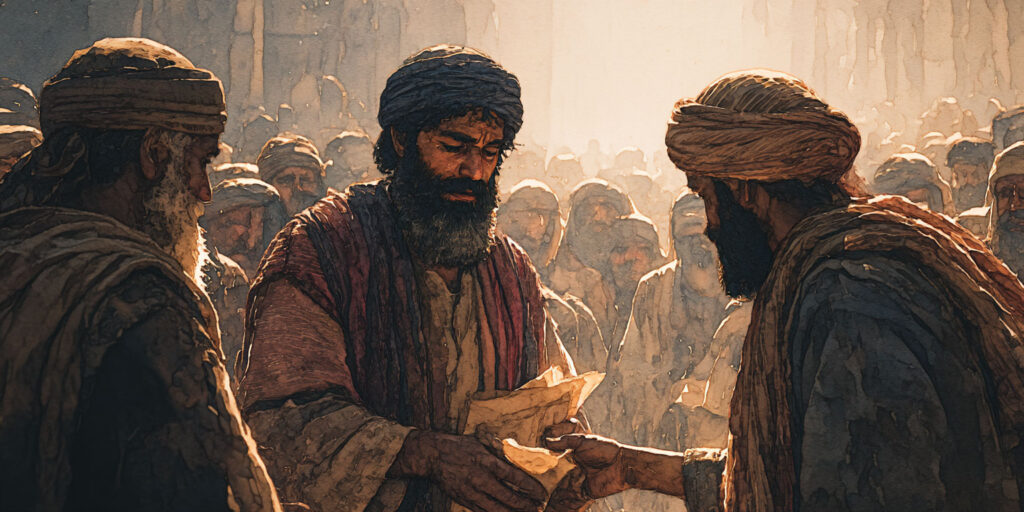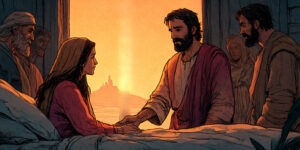
Peace
The gospel claims something bold: God offers real peace. Peace with Him, peace inside yourself, and peace with other people. But that peace isn’t automatic…

The next day Moses sat to judge the people, and the people stood around Moses from morning till evening. When Moses’ father-in-law saw all that he was doing for the people, he said, “What is this that you are doing for the people? Why do you sit alone, and all the people stand around you from morning till evening?” And Moses said to his father-in-law, “Because the people come to me to inquire of God; when they have a dispute, they come to me and I decide between one person and another, and I make them know the statutes of God and his laws.” Moses’ father-in-law said to him, “What you are doing is not good. You and the people with you will certainly wear yourselves out, for the thing is too heavy for you. You are not able to do it alone. Now obey my voice; I will give you advice, and God be with you! You shall represent the people before God and bring their cases to God, and you shall warn them about the statutes and the laws, and make them know the way in which they must walk and what they must do. Moreover, look for able men from all the people, men who fear God, who are trustworthy and hate a bribe, and place such men over the people as chiefs of thousands, of hundreds, of fifties, and of tens. And let them judge the people at all times. Every great matter they shall bring to you, but any small matter they shall decide themselves. So it will be easier for you, and they will bear the burden with you. If you do this, God will direct you, you will be able to endure, and all this people also will go to their place in peace.”
Exodus 18:13:23
Israel was barely out of Egypt when another crisis surfaced—not water, food, or enemies, but leadership overload. Moses spent sunrise to sunset judging disputes for a nation of hundreds of thousands. People waited; Moses wore down. Enter Jethro, his father-in-law, with the counsel that reshaped Israel’s life together.
Bottlenecked justice: “What you’re doing is not good… you will surely wear yourselves out” (vv. 17–18).
A tired leader and a tired people: When everything depends on one person, no one thrives.
Jethro’s first instruction isn’t managerial—it’s spiritual:
“You must represent the people before God and bring their cases to God” (v. 19).
Moses’ non-delegable work was prayer, teaching God’s ways, and setting the big direction.
“Look for able men… and appoint them as heads of thousands, hundreds, fifties, and tens.” (vv. 21–22)
Structure: scalable layers of responsibility.
Flow: routine cases handled locally; hard cases escalated.
Goal: “It will be easier for you… they will bear the burden with you” (v. 22).
Jethro’s qualifications still preach:
Competent (“able”)
God-fearing (they answer to a higher Judge)
Trustworthy (“men of truth”)
Incorruptible (“hating dishonest gain”)
Skill matters, but character carries.
Scarcity trained Israel to depend on God daily. This plan kept that focus: Moses remained the primary intercessor and teacher, while the people learned to serve one another.
Keep the main thing the main thing: prayer, the Word, vision.
Delegate outcomes, not just tasks: give real authority with accountability.
Build teams, not pedestals: leadership is stewardship, not spotlight.
Every member has a part. The body atrophies when parts don’t function.
Right people, right roles: character first; then fit and training.
Small circles, quick care: “tens and fifties” are today’s small groups and ministry teams.
Try the FAT posture:
Faithful – show up, follow through.
Available – make space in your calendar.
Teachable – receive input, grow skills.
(And add Energetic/Responsive: serve with initiative, not inertia.)
Leaders last longer.
People go home in peace—needs met, justice done.
God’s work multiplies through many hands and humble hearts.
Moses’ greatness wasn’t that he did everything; it’s that he did the right things—and trusted others with the rest. That same humility and shared burden is how communities become resilient, joyful, and fruitful under God.

The gospel claims something bold: God offers real peace. Peace with Him, peace inside yourself, and peace with other people. But that peace isn’t automatic…

Advent starts by asking us to slow down and look past the distractions. Every culture wraps Christmas in its own extras—traditions, shopping, decorations, sentimental ideas.

After Paul left Galatia, other teachers came. They questioned Paul’s authority and offered the Galatians a far more “comfortable” message…

Jesus leaves the synagogue in Capernaum and steps into a home. Simon Peter’s mother-in-law lies with a high fever.

Paul writes to a church he has never visited, yet he sounds like a pastor who knows them well: he encourages, challenges, and points every road back to Christ…

Biblical hope isn’t wishful thinking or daydreams. It is a confident expectation anchored in what God has already done in Christ and what he has promised to complete…